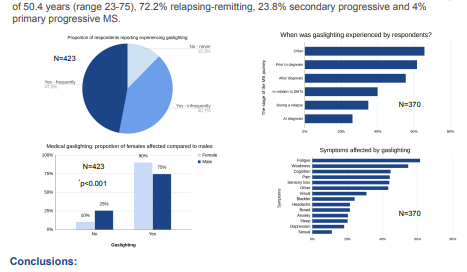ECTRIMS 2023: Medical Gaslighting in People with Multiple Sclerosis
Medical gaslighting describes a behaviour in which a HCP dismisses or downplays a patient's physical symptoms or attributes them to something else, such as a psychological condition.
This is a short newsletter to thank you and let you know that we submitted an abstract on the data we collected through the MS-Selfie Gaslighting survey we did in August last year. The good news is the abstract was accepted, and we are presenting it at ECTRIMS this week. When managing MS and setting the MS service agenda for the next 50+ years, the problem of ‘medical gaslighting’ needs to be addressed urgently. Do you agree?
You can download the poster from Prof G’s slideshare folder.
Title
Medical Gaslighting in People with Multiple Sclerosis
Authors
Rachel Horne1, Süleyman Güler2, Mitzi Williams3 and Gavin Giovannoni1
Affiliations
1Queen Mary University of London, 2Sanliurfa Training and Research Hospital, 3Joi Life Wellness Group
Scenario
“Whenever I see my neurologist, he fobs me off as if I don’t have any problems. He disagrees with me when I tell him my MS is worsening. My MS is apparently stable, as my MRI and neurological examination are unchanged. He doesn’t believe or even acknowledge me when I tell him that I am more forgetful and that my fatigue affects the quality of my work. Is there anything I can do about this?”
Definition
Medical gaslighting describes a behaviour in which a healthcare professional dismisses or downplays a patient's physical symptoms or attributes them to something else, such as a psychological condition.
Objectives and aims
A survey of people with multiple sclerosis (pwMS) to establish (1) the level of awareness of medical gaslighting and (2) how often they experience medical gaslighting.
Methods
Online survey of pwMS subscribing to MS-Selfie (www.ms-selfie.org).
Results
424 responses (85% female, 15% male) from the 22nd to 29th August 2022 with a mean age of 50.4 years (range 23-75), 72.2% relapsing-remitting, 23.8% secondary progressive and 4% primary progressive MS.
Conclusions
Medical gaslighting is a major problem for pwMS.
MS diagnosis may take longer due to medical gaslighting.
Once diagnosed with MS, medical gaslighting may cause delay in diagnosing MS relapses and escalating patients to more effective disease-modifying therapies.
Medical gaslighting disproportionately affects women.
HCPs should take active steps to counteract the impact of medical gaslighting on the management of pwMS.
Acknowledgements
We thank MS-Selfie subscribers for completing the survey and agreeing to allow the results to be presented and published.
Other MS-Selfie Newsletters on Medical Gaslighting
Subscriptions and donations
MS-Selfie newsletters and access to the MS-Selfie microsite are free. In comparison, weekly off-topic Q&A sessions are restricted to paying subscribers. Subscriptions are being used to run and maintain the MS Selfie microsite, as I don’t have time to do it myself. You must be a paying subscriber if people want to ask questions unrelated to the Newsletters or Podcasts. If you can’t afford to become a paying subscriber, please email a request for a complimentary subscription (ms-selfie@giovannoni.net).
Important Links
General Disclaimer
Please note that the opinions expressed here are those of Professor Giovannoni and do not necessarily reflect the positions of Queen Mary University of London or Barts Health NHS Trust. The advice is intended as general and should not be interpreted as personal clinical advice. If you have problems, please tell your own healthcare professional, who will be able to help you.









Such a coincidence to have received this today as I was lying in bed last night thinking about this very thing and how it's happened to me on more than one occasion. It was mostly prior to diagnosis but also after. The conclusion of my first GP appointment when half of my body had gone numb was to download a mindfulness app. And since diagnosis I have been questioned by a professional as to whether I'd imagined some symptoms after reading more about MS following diagnosis. Really interesting to see these survey results - thank you!
This is also the first time I've ever posted anywhere about this illness.
The harm goes further than delayed diagnosis for one condition (eg MS) as after a while you start to lose all confidence in your own judgement on anything - your body and senses tell you one thing, but you've been told that they lie to you, so how do you know what is real and what isn't? It does lasting psychological harm. Every medical appointment you go in with anxiety that you won't be believed, that if you show any emotion your symptoms will be dismissed and that you'll be patronised. Then you are told you are anxious or antagonistic and again your physical symptoms are dismissed. If a practitioner truly believes that someone does not have the symptoms they report, then refer for psychiatric evaluation. Otherwise, believe the patient.